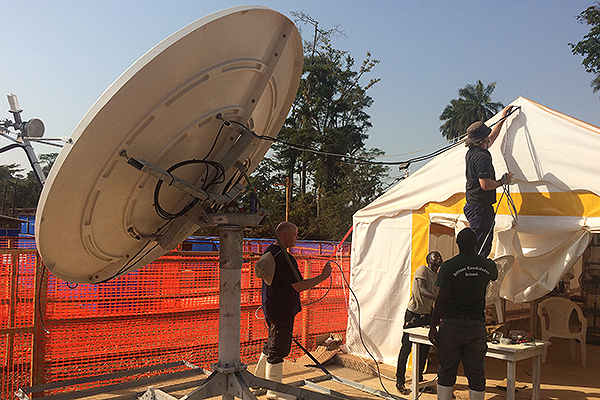West Africa: Ebola Outbreak
Crisis

On 23 March 2014, Guinea’s Ministry of Health notified the World Health Organization (WHO) of a rapidly evolving outbreak of Ebola Virus Disease (EVD, or “Ebola”) in the south-eastern region of the country. In the following months, the virus spread across Guinean borders, affecting Sierra Leone and Liberia. As the EVD outbreak increased exponentially, in August 2014 WHO declared a public health emergency of international concern, following which the humanitarian community mobilized to respond to the crisis.
Although the ET Cluster was not officially activated in West Africa, the UN Mission for Ebola Emergency Response (UNMEER) mandated World Food Programme (WFP) to respond as if the cluster was activated and to act as the global lead of the ET Cluster for inter-agency Information and Communications Technology (ICT) efforts.
After one and a half years of presence of the ET Cluster in the three affected countries, the ET Cluster was demobilised from West Africa as of 31 December. In November, Sierra Leone became the first country where the ET Cluster demobilised followed by Guinea and Liberia on 31 December 2015.
Organizations are encouraged to share ICT updates with the West Africa ET Cluster team.
ET Cluster Response to the Ebola Outbreak
ET Cluster Users
- Ebola Treatment Units and other frontline response centre such as Community Care Centres, Observational Interim Care Centres and Ebola Holding Centres;
- National and District Ebola Response Centres, responsible for coordination, case management, surveillance, safe burials ans social mobilisation to get to zero cases;
- Mission Logistics bases and Forward Logistics bases, where equipment ranging from medical protective equipment to electricity generators warehoused;
- Offices and accomodations of various UN agencies and NGOs responding to the Ebola Outbreak
ET Cluster Services
- On site assessments and reccomendations to access internet and/or radio communications;
- Reliable internet access: installation of satellite dishes, access points and wireless equipment;
- Security Telecommunications: installation and programming of radio equipment, trainngs;
- Transition to recovery: guidance and support in transitioning to commercial solutions.